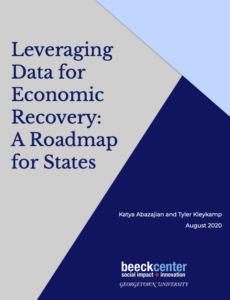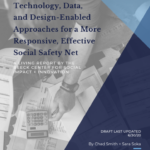States Can Support an Equitable Recovery with Data – Here’s How
August 10, 2020 – By Katya Abazajian + Tyler Kleykamp
Since the onset of the COVID-19 pandemic, state governments have used data to respond to real-time needs for critical information. Every day, governors review data and visualizations to react to the evolving challenges of the pandemic. As we learned from state Chief Data Officers in May, CDOs are working overtime to create the dashboards that governors use and share with the public, map food distribution sites, and integrate testing and hospitalization data across disparate sources.
While state governments must react to immediate, shifting conditions on a daily basis, they’re left with little time to plan for economic recovery from the fallout. As of June, over 30 million Americans had filed jobless claims. Early reports of economic impacts outline tough times for small businesses, renters, working parents seeking childcare, food insecure households, and others in vulnerable situations. To account for these staggering shifts, states’ recovery efforts must be sustainable, infrastructural, and forward-looking.
 READ THE FULL REPORT
READ THE FULL REPORT
Policy makers need to decide how to respond to each new wave of the virus over the coming years. They’ll need to understand how separate social programs interact with one another, when cutting support to one system may overburden another. States should lean heavily on data to make these difficult decisions on the path toward economic recovery.

States that have begun long-term recovery planning are doing so under a framework that was created after Hurricane Katrina nearly 15 years ago and predates the existence of state CDOs along with other modern data and digital service approaches. While we know that the pandemic has disproportionately affected poor communities and communities of color, we still don’t know what the long-term effects will be on these communities. By improving the way they use data, states can go beyond restoring the pre-pandemic conditions that enabled these disproportionate impacts to an environment that supports equity and mobility from poverty.
Leveraging Data for Economic Recovery: A Roadmap for States is a guide to rebuild the system to be better than it was before. The roadmap is initially focused on four main areas where data can be used in recovery efforts: workforce and education, health and benefits, neighborhood well-being, and budget reallocation. Each of these areas contains a series of use cases where states are uniquely positioned to leverage their data or policy making ability to improve recovery efforts. Some use cases outlined in the report should be feasible and actionable across states, while others require stronger enabling conditions that could shift the landscape of data use for economic recovery. Busting silos and enabling better statewide collaboration remains key to ensuring that public servants across agencies can build on and support each others’ efforts. This report not only points CDOs toward the future of their work, but outlines the powerful assets that CDOs already have at their disposal.
State CDOs play a critical role in advancing on the road to recovery. The role has proven essential to developing multi-agency emergency response functions to COVID-19 and will continue to be crucial in coordinating statewide data-driven plans for economic recovery. CDOs can implement the steps outlined in the roadmap by building more sustainable frameworks for collaboration and consulting on technical issues such as data integration, visualization, or privacy. However, CDOs need support. CDOs need comprehensive data sharing agreements and support in shifting states toward more data-driven culture to run successful data programs. Top-level leaders, including governors, must commit to leveraging data as critical infrastructure for COVID-19 response and recovery. This roadmap provides them with clear steps to take on that path.
Katya Abazajian is a researcher for the State Chief Data Officers Network, and an affiliate of the Berkman Klein Center for Internet & Society. Follow her at @katyaabaz.
Tyler Kleykamp is a Beeck Center Fellow and Director of the State Chief Data Officers Network. Follow him at @tkleykamp.